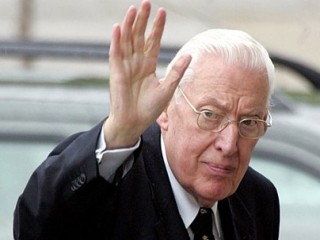
Ian Paisley biography
Date of birth : 1926-04-06
Date of death : -
Birthplace : Armagh, Northern Ireland
Nationality : Irish
Category : Politics
Last modified : 2011-06-29
Credited as : Politician, First Minister of Northern Ireland, Democratic Party
Ian Kyle Paisley, born on April 6, 1926, was reared in the tradition of evangelical Protestantism. His father, a Baptist minister, ordained him in 1946 when he was 20 years old and by 1951 the young Paisley felt able to found his own church, the Free Presbyterian Church of Ulster, and to make himself its moderator.
Publicity was gained by outbursts against Catholicism and the "Romeward" inclinations he attributed to other Protestant churches, and he rose to prominence attacking both ecumenism and the granting of full civil rights to a disadvantaged sector that was largely Roman Catholic. Dismissed as a rabble-rousing bigot in established Unionist and Orange circles, he eventually challenged these with his own version of both political party and Orange Order.
In 1951 he acquired local notoriety by adopting the cause of Maura Lyons, a 15-year-old Catholic girl who left her home to join his church. His reputation widened when he protested in Rome against the Second Vatican Council in 1962, and the following year he opposed the lowering of the Belfast City Hall flag in respect at the death of Pope John XXIII. With growing momentum his politico-religious drive mounted in the 1960s: against the tricolor of the Irish Republic being used in the 1964 election campaign; against better relations with the Republic on the occasion of Dublin premier Sean Lemass's visit to Belfast in January 1965; against Terence O'Neill's conciliatory and modernizing policies; against the general assembly of the Presbyterian Church in 1966; against the Northern Ireland Civil Rights Association in 1968, and against the Peoples Democracy movement in 1969. In all he mobilized the genuine fears of working people that their traditional safeguards within the United Kingdom and against Catholic clerical influence were being undermined. In 1966 he had founded his Protestant Unionist Party (to become the Democratic Unionist Party in 1971), a couple of shadowy organizations—the Ulster Constitution Defence Committee and the Ulster Protestant Volunteers—and the Protestant Telegraph, a publication promoting anti-Catholic and anti-nationalist virulence.
In 1969 he unsuccessfully challenged Terence O'Neill in the latter's Bannside constituency, but after O'Neill's retirement in 1970 Paisley won the seat and held it till the end of the Northern Ireland Parliament in 1972. He also entered Westminster as Member of Parliament for North Antrim in 1970. After the fall of the Belfast Parliament in March 1972, Paisley became a member of the Northern Ireland Assembly (1973-1975), where he opposed the Sunningdale agreement which provided for a power-sharing executive worked out by Brian Faulkner. He subsequently became a member of the Northern Ireland Constitutional Convention, which he and his United Ulster Unionist Council dominated during its short lifetime, 1975-1976. In 1979 he became Democratic Unionist Member of the European Parliament for Northern Ireland, topping the poll in this three-seat constituency.
These considerable political successes were accompanied by the expansion of his church organization, which grew in numbers and locations. Though his school education did not prepare him for university entrance, his biblical scholarship was respected and his An Exposition of the Epistle to the Romans Prepared in a Prison Call is well regarded. A powerful preacher with a dominating physique and voice, he played on traditional anti-Catholicism and emphasized biblical fundamentalism, always being outspoken and always seeing himself in historic roles.
A practiced television performer, quick to make a telling phrase or newsworthy comment, he kept his profile high, bringing his wrath to bear on familiar targets: London-Dublin talks of any kind; Catholic influences in the European Union; Catholic characteristics of the Irish Republic; any power-sharing arrangement with nationalists inside Northern Ireland; and British security policy in Northern Ireland, which he always labeled half-hearted and ineffective. He himself advocated armed preparedness and dabbled with a "Third Force" vigilante movement to protect loyalists.
Paisley helped to make the Northern Ireland Assembly of James Prior work, although he opposed its "cross-community support" requirements and argued for the devolution of increased powers to a majority party. He was able to present a more statesmanlike image, the colorful phrase and witty aside disarming his critics, his firm determination to uphold the Union and biblical truth continuing to inspire his followers. His wife Eileen (married in 1951) and three of their four children played supporting political roles. Yet to many observers he still epitomized the bigotry and violence of Protestant extremism which fueled an equal Catholic extremism. Many pointed to the image of Northern Ireland he helped to create—an image of bitterness and intransigence—which repelled potential friends and served well the propaganda of his avowed enemies. His destructive successes—including a large share in ending the premiership of Terence O'Neill—were visible: positive achievements were harder to discern.
From the mid-1980s through the mid-1990s Paisley's presence continued to make an impact. In 1985 he addressed the founding meeting of Ulster Resistance, whose members were later involved in arms deals. In October 1988 he was beaten and removed from a European Parliament meeting in Strasbourg, France, after displaying a sign that read "John Paul II Antichrist" as the Pope spoke. The Clinton administration in the U.S. prohibited Paisley from visiting the White House due to his militantly anti-Catholic attitudes.
Paisley's uncompromising viewpoints have mostly served him well. His popularity was demonstrated in 1989 when he received more votes to the European Parliament than any politician in United Kingdom electoral history. In the subsequent European Parliament election of 1994, he obtained more than in 1989.
Paisley remained a forceful spokesman and magnet for the right wing, responsible for compelling many of his opponents to become more conservative. Meanwhile, the two extremes in Northern Ireland continued to feed each other. The moderate majority, unable to unite, was condemned to endure their conflict.


















